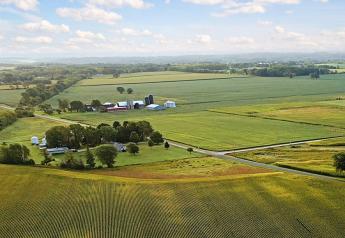First Thing Today | March 24, 2022

Grain, soy markets retreat overnight... Grain and soy markets faced price pressure overnight and are trading near session lows this morning. As of 6:30 a.m. CT, corn is trading 2 to 6 cents lower, soybeans are 12 to 15 cents lower, winter wheat is mostly 13 to 17 cents lower and spring wheat is 6 to 9 cents lower. Front-month U.S. crude oil futures are near unchanged after earlier pushing above $116 and the U.S. dollar index is around 125 points higher this morning.
Russia/Ukraine update... President Joe Biden and alliance leaders gathered in Brussels for a summit to discuss providing further support to Kyiv. NATO Secretary-General Jens Stoltenberg said the alliance would boost its forces in Eastern Europe by deploying four new battle groups in Bulgaria, Hungary, Romania and Slovakia. The U.S. said it has assessed that members of Russia’s forces have committed war crimes in Ukraine, U.S. Secretary of State Antony Blinken said. A White House “Tiger Team” of national security officials is sketching responses for the U.S. and allies if Putin “unleashes his stockpiles of chemical, biological or nuclear weapons,” the New York Times (NYT) reports. The Tiger Team is also examining responses if Putin reaches into NATO territory to attack convoys bringing weapons and aid to Ukraine, according to several officials involved in the process cited by NYT.
Plan to use U.S. LNG to curb Europe’s dependence on Russian energy... A plan to diversify Europe’s gas supply to reduce its reliance on Russian sources and begin replacing it with U.S. liquefied natural gas (LNG) is expected to be made official today. U.S. National Security Adviser Jake Sullivan said the U.S. was looking for ways “to increase LNG supplies — surge LNG supplies to Europe — not just over the course of years, but over the course of months as well.”
Pressure grows on cropping some CRP acres... In a letter USDA Secretary Ton Vilsack on Wednesday, seven agriculture lobbying organizations representing U.S. farmers, feed producers, grain exporters, millers, bakers and oilseed processors asked USDA to provide flexibility to farmers to plant crops on more than 4 million acres of “prime farmland” currently enrolled in CRP without penalty. “It remains unclear whether Ukrainian farmers will be able to safely plant crops this spring,” the letter said. “Time is of the essence. The planting window in the United States has already opened.” If those acres are planted, at 2021’s average corn yield, that could mean an additional 18.7 million metric tons of grain produced. The letter, signed by the American Farm Bureau Federation, the National Grain and Feed Association and others, echoes a March 8 request by Sen. John Boozman (R-Ark.) of Arkansas, and calls from some agriculture economists. Some of those pushing for the CRP change point to the European Union, which will allow crops on conservation acreage this spring. EU Agriculture Commissioner Janusz Wojciechowski said last week the EU is working on measures that would allow fallow land to be used to grow protein crops to avert a scarcity of feed, and measures to support the pork industry. The broader call for bringing some conservation land into production could boost pressure from some groups to have EPA reduce its biofuels blending mandates.
Corteva: Farmers are starting to bring on extra acres... Due to rising commodity prices, farmers will plant more acres to crops, according to Corteva Inc. Chief Technology Officer Sam Eathington. This is probably a multiyear trend around high commodity prices, Eathington said in a Wednesday interview cited by Bloomberg. “When you start seeing the corn, soybean, cotton, wheat commodity numbers, you’re going to bring acres into production if you can,” he said. Crop chemical supplies are tight because of supply-chain disruptions, and some farmers are having difficulty with availability of products. Corteva hasn’t seen any dramatic change in farmer seed choice, he added.
U.S. reinstates some expired product exclusions from tariffs on Chinese imports... The U.S. Trade Representative's office said on Wednesday it has reinstated 352 expired product exclusions from U.S. "Section 301" tariffs on Chinese imports. The reinstated product exclusions will be effective retroactively from Oct. 12, 2021, and extend through Dec. 31, 2022. They cover a wide range of the initially estimated $370 billion worth of Chinese imports that former president Donald Trump hit with punitive tariffs of 7.5% to 25%. China's commerce ministry said the U.S. decision was beneficial to normalizing the trade flow and hoped bilateral trade relations would get back on a normal track.
Weekly Export Sales Report out this morning… For the week ended March 17, traders expect:
|
|
2021-22 expectations (in MT) |
2021-22 last week |
2022-23 expectations (in MT) |
2022-23 last week |
|
Corn |
800,000-1,800,000 |
1,836,357 |
100,000-400,000 |
204,000 |
|
Wheat |
100,000-600,000 |
145,930 |
100,000-300,000 |
325,563 |
|
Soybeans |
500,000-1,300,000 |
1,253,181 |
300,000-800,000 |
477,000 |
|
Soymeal |
100,000-300,000 |
147,363 |
0-35,000 |
0 |
|
Soyoil |
0-30,000 |
22,639 |
0-10,000 |
0 |
Indonesia’s biodiesel exports expected to surge... Indonesia, the world’s largest palm oil producer, is expected to export 1 million kiloliters of biodiesel this year as demand increases due to rising crude oil prices, Vice Chairman of Indonesia Biofuel Producer Association, Paulus Tjakrawan, said in an interview with Bloomberg. Exports were only about 91,500 kiloliters in 2021. The association sees this year’s robust demand coming from China and European countries. Meanwhile, Indonesia will push for a greater proportion of palm oil in biofuels even as the edible oil’s price is historically high. The government won’t stop at B30 mandate, which requires that fossil fuels be blended with 30% palm oil, said Airlangga Hartarto, coordinating minister for economic affairs. Officials are studying the rules and infrastructure to increase the requirement beyond that, Energy and Mineral Resources Minister Arifin Tasrif added. Indonesia put on hold its plan to increase palm content in biodiesel to 40% last year, before restarting preparations to do road tests on vehicles using that mix this year.
Argentina’s food sector is rejecting government accusations on price rises... Argentina’s food business group COPAL rejected accusations made by Interior Commerce Secretary Roberto Feletti that blamed the sector for inflation and price increases. The secretary’s remarks didn’t promote dialogue and instead put culpability on the food and beverage sector, despite the government having recognized inflation as having many causes, the food group said. Breaches mentioned by secretary aren’t responsibility of supplier companies, according to COPAL, which urged the government to avoid looking for culprits within an industry and to join forces to move forward with concrete measures. Meanwhile, Argentina’s government will create a new basket of 60 goods with regulated prices in April, Feletti announced Wednesday. He said the new basket will be rolled out along with the next edition of the government’s broader price control program known as Precios Cuidados. Feletti said the government will return wheat prices to levels from January.
U.S. and Japan reach deal on beef tariffs... The U.S. and Japan announced an agreement that lowers the chances of Japan imposing higher tariffs on U.S. beef. The agreement includes a new mechanism that requires three separate conditions to be reached – instead of only one – for Japan to invoke a “safeguard trigger” and impose higher duties on U.S. beef for 30 days. For the safeguard tariffs to kick in, total beef imports from not only the United States but also the 11 members of the Comprehensive and Progressive Agreement for Trans-Pacific Partnership (CP-TPP) must exceed the threshold set in the CP-TPP agreement.
Negative Cold Storage data... USDA’s Cold Storage Report Wednesday afternoon showed beef stocks rose contra-seasonally in February to a record for the month. Pork stocks climbed more than the five-year average last month. The report data could weigh on livestock futures this morning.
Surprises in the cash cattle market... Cash cattle trade unexpectedly got started on Wednesday, with sales reported in the $137 to $138 range in the Southern Plains and mostly around $221 in the northern dressed market. Not only did the trade come earlier than cash sources anticipated, but feedlots unexpectedly moved cattle at lower prices. Despite the disappointing cash trade, April live cattle ended unchanged and high-range for the day.
Pork cutout, cash hog index both decline... The pork cutout value was unable to hold morning gains as bellies softened in afternoon trade, pulling the cutout 32 cents lower for the day. The CME lean hog index is down 56 cents for its second straight daily decline. Softer cash fundamentals may limit followthrough buyer interest in futures after Wednesday’s strong gains.
Overnight demand news... Jordan made no purchase in its tender to buy 120,000 MT of optional origin wheat.
See ‘Policy Updates’ for late-breaking morning news updates... For updates to items in “First Thing Today” or any late-breaking morning news stories, check “Policy Updates” on www.profarmer.com.
Today’s reports
- 7:30 a.m. Weekly Export Sales — FAS
- 2:00 p.m. Livestock Slaughter — NASS






